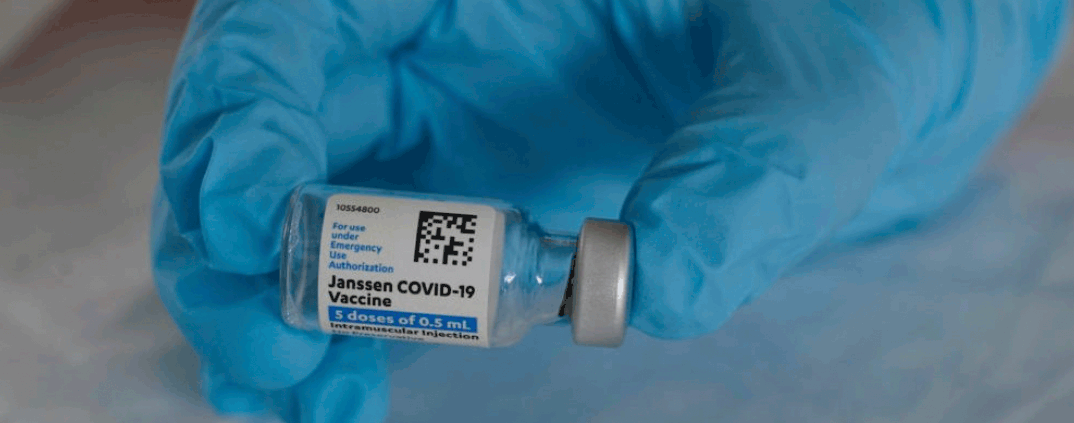Massachusetts Explores The Advantages And Potential Challenges Of The Johnson & Johnson Vaccine, WBUR
Massachusetts received 58,000 doses of the Johnson & Johnson coronavirus vaccine this week, the first shipment of what could be a substantial boost in vaccination efforts here and across the country. But it’s not clear how that boost will play out or when it will start. Gov. Charlie Baker says he’s not expecting any more J&J deliveries until late March or early April.
And Baker hasn’t spelled out how Massachusetts might target the J&J vaccine given its unique advantages: it’s a single dose shot, and it can be moved around a lot — even jostled — without risking stability.
We have some information about how hospitals, health centers and other vaccination programs plan to integrate J&J, but first, let’s look at some numbers that are getting a lot of attention.
Seventy-two percent of Americans who received the J&J vaccine in trials were protected from a mild to moderate case of COVID-19, as compared to more than 90% for the vaccines from Moderna and Pfizer-BioNTech. The three are similar at preventing the worst outcomes: hospitalizations and death. Public health and medical experts are urging people to get any vaccine offered.
“If someone offered me any one of those three vaccines, I absolutely would be comfortable and would be very willing to take any one of those three,” said Dr. Paul Biddinger, who chairs the vaccine advisory board in Massachusetts.
You Get What You Get
In fact, you may not have a choice. Many hospitals and health centers say they’ll give patients the vaccine that’s available at the time of their appointment because managing the timing, logistics and supply of three different vaccines is complicated enough.
Charles River Community Health, which serves 15,000 mostly low to moderate income patients at clinics in Alston-Brighton and Waltham, has been told to expect alternating deliveries of Moderna one week and J&J the next. Other health centers are getting Pfizer as well. And if patients object to the week and the vaccine they’re offered?
When can I get a vaccine? Is it safe? What are the side effects? Get this info & more in your inbox each week. Sign up now.
“We’ll attempt to educate them,” says Charles River CEO Elizabeth Browne. “If patients feel really strongly about one vaccine or the other, we’ll say, ‘We hope you can understand that we need to vaccinate as many people as we can as quickly as possible.’ ”
It remains unclear whether all of the state’s large-scale vaccination centers will begin receiving the J&J vaccine once supplies increase, in addition to Moderna and Pfizer. Tufts Medical Center, which began injecting J&J doses this week, is also not offering or entertaining a patient’s choice.
“That’s for a variety of reasons,” says Dr. Helen Boucher, chief of infectious diseases at Tufts. “The first and most important is that there is no reason to pick one over the other” because all three are safe and effective.
In addition, says Boucher, hospitals may only know which vaccine or vaccines they are getting a few days in advance and for safety, it’s simpler to deliver just one at a time.
Lee Nave, a patient at Tufts Medical Center, says he thought he would be getting Pfizer or Moderna Thursday because the registration process had included booking a second shot. But when Nave arrived for his appointment, he was told the syringe would hold the single-dose J&J vaccine.
Nave remembers a mix of feelings. He had read that J&J was not as good at preventing infections overall but good at preventing serious illness.
So, he decided, “If this is one you’re offering me, I’ll take it. And it also seems very convenient to have one shot and get it out of the way,” Nave says.

Boucher says most patients she talks to are thrilled to get vaccinated. Still, she’s hearing some questions. Some patients are concerned that the J&J vaccine relied on cells derived from abortions during vaccine development.
The Boston archdiocese said in a statement that Catholics can request a specific vaccine but should not delay getting inoculated if their choice isn’t available.
“We hope that they will ask questions, receive the relevant information about that teaching, and not delay in their acceptance of the vaccination — whichever approved vaccine is offered — when it becomes available to them.”
One and Done
There’s some early evidence of strong interest among Massachusetts residents in the J&J vaccine. In Barnstable County, 1,200 appointments posted online on Friday were gone in 35 minutes.
Some people, like Nave, may prefer the convenience of booking and showing up for a single appointment, and those who dislike shots will appreciate the option of just one jab. There’s also some evidence of fewer side effects from the J&J vaccine, perhaps because it is just one shot. Symptoms like headaches, fever and nausea are more common with Pfizer and Moderna after the second shot.
“We already had people asking for it,” says Dr. Joanna Duby, medical director at Element Care PACE, a program for high risk elders who want to stay in their homes. The program expects to receive some J&J doses for the first time next week.
Element Care runs six PACE clinics across the North Shore and Merrimack Valley. Duby says bringing participants in for one shot rather than two will make logistics much easier. Before COVID, the program’s wheelchair-accessible vans could carry up to 12 people at a time. Now, with safe distancing, it’s one or two people.
“So you can imagine that with a decent size clinic it takes a lot of trips back and forth to bring these people in,” says Duby.
Targeting Homebound and Homeless Patients
Baker has suggested that the J&J vaccine might be especially useful for some hard to reach populations, such as residents who rarely leave their homes and people who don’t have stable housing. The vaccine does not come with the warnings about limiting transportation of the vials to avoid breakdown that accompany the other two available vaccines. But it does have other limitations that will make it hard to use with homebound seniors and other patients.
Here’s the issue: the five doses in a J&J vial must be used within two hours once the vial is punctured — or within six hours if kept refrigerated at 36-46 degrees. That’s easy in a clinic but very difficult for a traveling nurse who must sit and observe a patient, in their home, for 15-30 minutes after the injection.
“If we’re using this for the homebound, it has to be quick,” says Duby, “or we’ll have to have a monitored cooler when transporting it to homes.”
Baker has also mentioned using J&J for mobile vaccination clinics.
Some programs that work with clients who don’t have stable housing are looking forward to receiving the J&J vaccine.
“A one-dose vaccine that is highly effective will be more easily administered to people experiencing homelessness,” said Dr. Jessie Gaeta, chief medical officer at the Boston Health Care for the Homeless Program, in a text. “It’s helpful to avoid the need for second doses when people have to necessarily move around frequently, don’t have stable housing or a reliable address or phone number.”
The state’s vaccine advisory committee is looking at whether there are other populations for whom the J&J shot might work best.
Once supply of the J&J vaccine ramps up, it looks like there won’t be any bonus doses. Pharmacists say that although they get an extra dose out of Pfizer and many Moderna vials, they don’t get six doses out of the five dose J&J vials.




